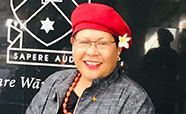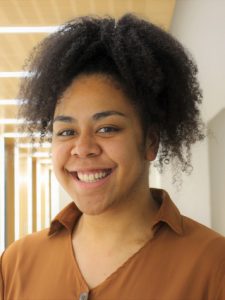It’s graduation this coming Saturday (21 Aug), and Te Tumu is lucky to have three Master of Indigenous Studies students who are graduating. This is always a wonderful occasion for graduates themselves, as well as their families and their supervisors.
 Tofilau Nina Kirifi-Alai (Sāmoa) was until recently the Manager of the University of Otago’s Pacific Islands Centre. She is currently the Inaugural Manager of Pacific Community Engagement, University of Otago, based in Auckland. This is a new role that the University of Otago established this year.
Tofilau Nina Kirifi-Alai (Sāmoa) was until recently the Manager of the University of Otago’s Pacific Islands Centre. She is currently the Inaugural Manager of Pacific Community Engagement, University of Otago, based in Auckland. This is a new role that the University of Otago established this year.
Research Title: “The Development of the Pacific Islands Centre at the University of Otago, Dunedin, New Zealand: A Personal Reflection”.
Supervisor: Telesia Kalavite
Abstract: “The purpose of a Centre for Pacific students is to seek and find ways whereby meanings, nuances and metaphors in Pacific cultures can speak to the heart, the soul and the mind of the students. The challenge here, as in other places, lies in how to articulate speech and writing to get meanings, nuances and metaphors of Pacific cultures within a monocultural academic environment” (Comment by His Highness Tui Atua Tupua Tamasese Ta‘isi Efi‘s inauguration speech at the formal opening of the Pacific Islands Centre, University of Otago, in 2003).
The establishment of the Pacific Islands Centre (PIC) in 2001 was a response by the University of Otago (UO) to the Tertiary Education Commission (TEC) initiatives to ensure the success of its Pacific students. Pacific Islands people’s participation in New Zealand society, including education, is still lagging behind that of the general population since the late 1960s. The PIC was the first-ever centre within New Zealand Tertiary Education Organisations (TEOs) and this year, 2021, marks its 20th anniversary. The PIC creates pathways for students’ success at the UO reflecting the government’s continuous attempt to improve the success rate of Pacific peoples in the education system. The PIC strongly becomes the impetus to lead and implement support for Pacific students and staff through its engagement with the UO and Pacific communities locally, nationally, regionally and internationally.
This research takes an autoethnographic Pacific approach. Autoethnographic because it documents my reflections as the inaugural Manager of the PIC since 2002; Pacific because it is a Pacific-focused centre, operated by Pacific staff for Pacific students and, most importantly, I, the researcher am Samoan, and of Pacific decent. My voice becomes central in documenting the Centre’s developmental history because when I first started as the pioneer of the PIC there was no specific Pacific model to build on, or strategic framework or manual to guide it. This research therefore, is basically grounded on Pacific philosophies of attitudes, views, ideas, values, beliefs, customs, traditions, practices and experiences of the researcher.
The PIC is significant for the educational development of Pacific students and staff at the UO. This research documents the journey of the PIC in terms of its history, developmental strategic plans, practices and reviews that enhance the success of everyone involved. This research is unique and authentic in its approach as it provides first-hand information on how the PIC nurtures Pacific Islands students in their academic journeys. It also adds value to the development of educational strategic directions of the UO to benefit both Pacific and non-Pacific communities at Otago, New Zealand, the Pacific region, and the world.
The first generation consists of the maternal and paternal grandparents of the author, in which they discuss vasu in its political definition of ‘half-caste’ or of mixed ethnic heritage. This generation will also elaborate on contributing themes to vasu, such as their relationships with their kinship groups, languages/dialects and their Fijian identity. As this generation is the only group to have regular visits and contact with their rural villages, vasu will be viewed through this lens.
The next generation is of the author’s parents and they will also discuss themes such as their own Fijian identity, as well as the role of Fijian women, domestic workers and accessibility to the village. This particular generation is part of the urban migration and will reflect over vasu with this viewpoint.
Finally, the last generation is of the author’s and her maternal and paternal first-cousins. The supporting themes for this generation’s understanding of vasu are customary Fijian relationships and concepts, mixed ethnicity and the use of Fijian language and knowledge. This generation is a part of the Fijian diaspora in New Zealand and will be using this perspective in sharing their understandings and experiences of vasu. Eventually, similar elements and concepts will be highlighted, with each generation sharing their own narratives on what vasu is to them. Despite the different time periods and physical contexts, the prominence of the maternal lineage has proven to play a significant role in every generation of this family, particularly in a patriarchal society that is known to Fiji.
 Nicola (Nicky) Andrews (Ngāti Pāoa) Nicky is currently a faculty librarian at the University of San Francisco where she teaches undergraduates how to do research; and work on other projects including research into Indigenous information literacy. She is open to pursuing a PhD in the future.
Nicola (Nicky) Andrews (Ngāti Pāoa) Nicky is currently a faculty librarian at the University of San Francisco where she teaches undergraduates how to do research; and work on other projects including research into Indigenous information literacy. She is open to pursuing a PhD in the future.
Nicky was initially supervised by the late Alumita Durutalo. Paerau Warbrick took over during the research design and interview phase, and Erica Newman supervised her work during the bulk of the writing and revising phase. Nicky is thankful to all three for their work and care. She will graduate in absentia.
Research title: “Historical Trauma, Indigenous People, and Libraries.”
Abstract: Historical trauma theory (HTT) built on understanding of Holocaust survivors and subsequent generations (Pihama et. al., 2014) and articulated how colonization and genocide against Indigenous peoples also resulted in historical trauma and intergenerational grief (Brave Heart & DeBruyn, 1998; Methot, 2019). In this research report, I examine how modern libraries reinforce historical trauma for Indigenous library users and workers through library origins, professional credentialing, staffing demographics, and policies. While historical trauma theory is rooted in social work (Brave Heart & DeBruyn, 1998), it is applicable to librarianship as a profession of public service that impacts Indigenous access to knowledge and self-discovery.
I conducted my research using kaupapa Māori and autoethnography frameworks, to interview five Indigenous librarians from Aotearoa, Canada, and the United States. Over Zoom, participants detailed their unique experiences as Indigenous people using libraries, studying library science, and working in libraries.
Participants spoke candidly about the racism and microaggressions they routinely encounter; and the isolating nature of often being the only Indigenous worker in their team or place of employment. In particular, participants recounted how historical trauma resurfaced when facing inadequate resources to support Indigenous knowledge, or when organizations reinforced policies that conflicted with Indigenous practices and worldviews.
However, participants also described hope and progress towards equity, aligning with contemporary shifts toward valuing Indigenous peoples in libraries. I make and acknowledge several recommendations in this report ranging from practical changes to library policies and practices, to frameworks to address historical trauma within library spaces. These practices can be applied beyond libraries into higher education, government work, and other sectors.
This Reseach can be accessed through OUR Archive.
Te Tumu would also like to congratulate Pipi Royal who will be graduating with their BA in Māori Studies.


